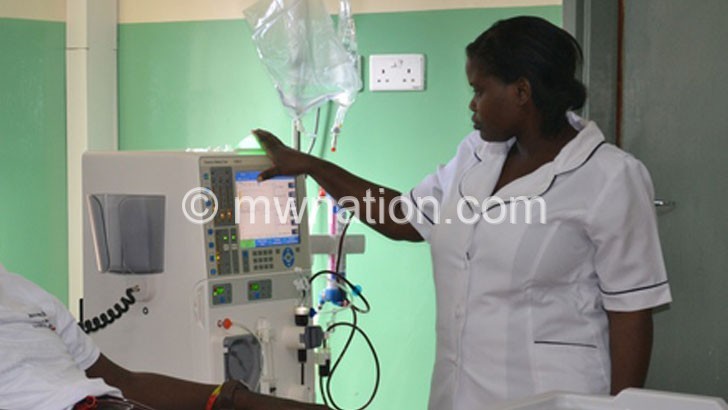Patients bemoan faulty dialysis machines
With only four dialysis machines catering for Central and Northern regions at Kamuzu Central Hospital’s Renal Unit in Lilongwe, patient’s lives are at risk.
In an interview yesterday, the Kidney Foundation chairperson Frank Mwale said the renal unit is currently serving 34 patients who undergo dialysis twice a week.

He said with the machines not working effectively, some patients report to the hospital twice a day to remedy effects caused by the machines.
Said Mwale: “We expect patients to be well after a dialysis session, but that is not the case now because they get all sorts of side effects. There are a lot of complications, with some getting swollen bodies after drinking water. It is not supposed to be that way.”
He said a patient, who undergoes dialysis, is expected to be fine for three or four days, but that has not been the case with patients at the renal unit.
“Patients end up coming twice in a day for sessions and this has caused some preventable deaths. We have lost about four lives between November and January due to the ineffectiveness of the machines. As a foundation, we feel betrayed by the government because these issues started a long time back,” Mwale said.
In an interview, one of the Lilongwe-based patients, Grace Chinyanga, said the machines have unbalanced electrons which affect the salt balance, causing patients to drink a lot of water after dialysis.
She said: “I go to the hospital twice a week, and the machines that I sit on are faulty. They have unbalanced electrons, meaning that the salts are not balanced. After dialysis, I end up drinking more water because of all the salts that have entered the body; then I start to swell. Due to the swelling, I have to return to the hospital to get the water drained from the system.”
Chinyanga said when they return to the hospital, they often have to wait for other patients to finish their sessions or return the next day.
“Not getting treated the same day means feeling pain all night because the stomach swells as digestion fails. And this can take a whole week, but the unit does not have enough machines. It is frustrating. I am one of the people who often get sick after using the machines. Many times I collapse,” she says.
Another patient, Kedron Chisale, who has lived with kidney problems for almost 10 years, says the machines were initially efficient and effective but over the years, they have been breaking down frequently.
“We noted that when one goes for dialysis, there was not much difference in terms of feeling better. It is sad that due to this problem, we have lost friends and colleagues in the dialysis unit,” she said.
Meanwhile, the patients are now getting the services in shifts and with four-hour sessions for each patient, the last group finishes late at night.
Currently, the KCH Renal Unit has four functional dialysis machines against a standard requirement of 10. They have a total of 17 machines, but most are faulty and do not function.
“Out of the four that are used, one is not fully functional such that we sometimes start a session on that machine and end up finishing on another one,” said Mwale.
Attempts to get a comment from Ministry of Health spokesperson Joshua Malango proved futile as he did not pick calls while KCH director Jonathan Ngoma asked to be interviewed later.
However, in a written response yesterday, presidential adviser on non-governmental organisations Martha Kwataine said government is working to address the challenges faced by kidney patients at the KCH Renal Unit.
She earlier also reiterated President Lazarus Chakwera’s commitment to addressing the challenges Malawians face in accessing health services.





